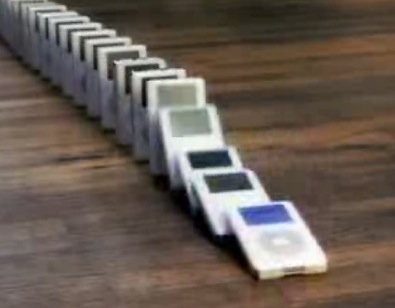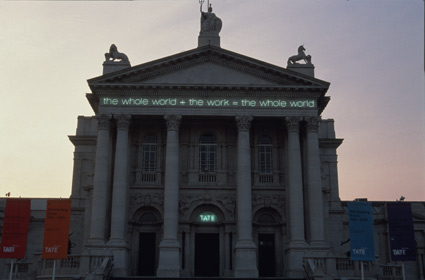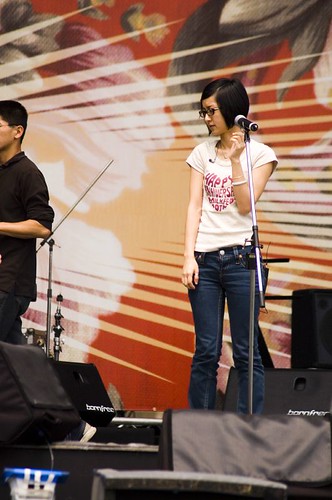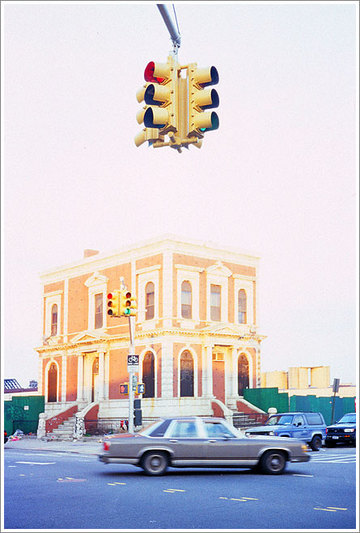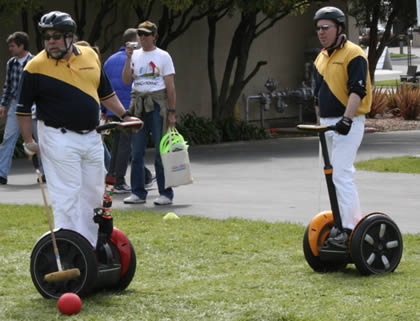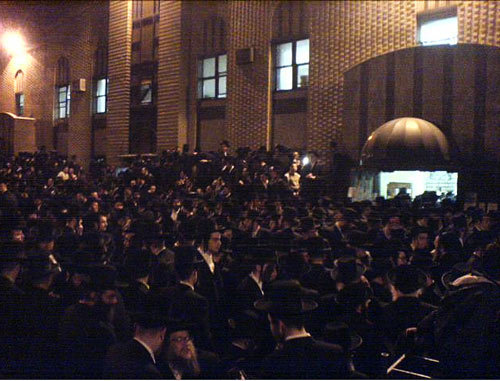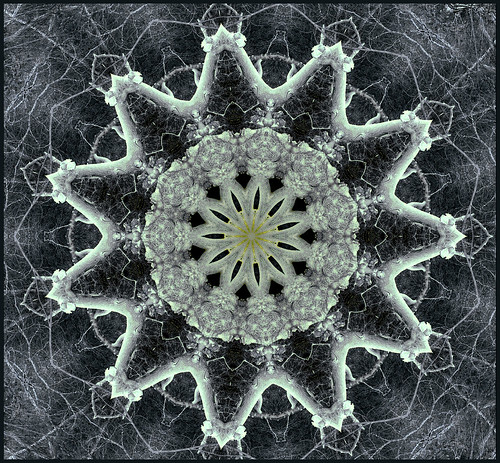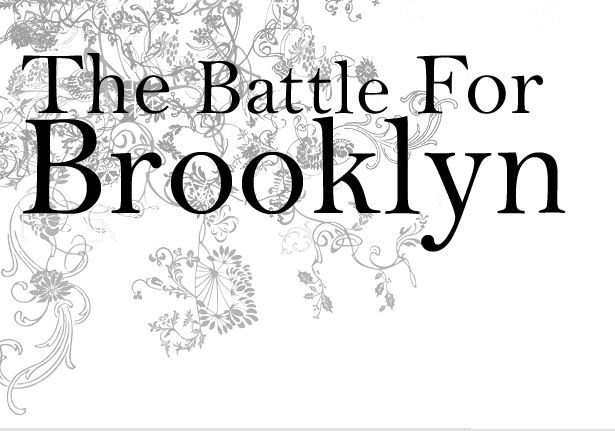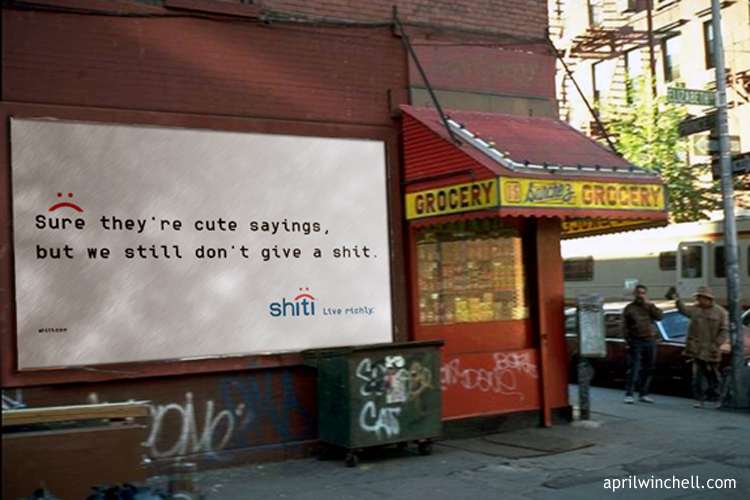
Colbert Lampoons Bush at White House Correspondents Dinner-- President Does Not Seem Amused
Colbert Lampoons Bush at White House Correspondents Dinner-- President Does Not Seem Amused:
A blistering comedy “tribute” to President Bush by Comedy Central’s faux talk show host Stephen Colbert at the White House Correspondent Dinner Saturday night left George and Laura Bush unsmiling at its close.
Colbert, who spoke in the guise of his talk show character, who ostensibly supports the president strongly, urged the Bush to ignore his low approval ratings, saying they were based on reality, “and reality has a well-known liberal bias.”
He attacked those in the press who claim that the shake-up at the White House was merely re-arranging the deck chairs on the Titanic. “This administration is soaring, not sinking,” he said. “They are re-arranging the deck chairs--on the Hindenburg.”
A blistering comedy “tribute” to President Bush by Comedy Central’s faux talk show host Stephen Colbert at the White House Correspondent Dinner Saturday night left George and Laura Bush unsmiling at its close.
Colbert, who spoke in the guise of his talk show character, who ostensibly supports the president strongly, urged the Bush to ignore his low approval ratings, saying they were based on reality, “and reality has a well-known liberal bias.”
He attacked those in the press who claim that the shake-up at the White House was merely re-arranging the deck chairs on the Titanic. “This administration is soaring, not sinking,” he said. “They are re-arranging the deck chairs--on the Hindenburg.”
BELLACIAO - CHERNOBYL : Hell on Earth, the world’s worst environmental disaster in 1986 - Joan - Collective Bellaciao
BELLACIAO - CHERNOBYL : Hell on Earth, the world’s worst environmental disaster in 1986 - Joan - Collective Bellaciao:
He took precautions but he also kept meticulous - albeit illegal - records of his own accumulating exposure. Every year the authorities told him he was "fit for duty", and when he left Chernobyl they gave him a letter saying he had received just under the safe lifetime dose of radiation. He knew he had received more than five times that amount.
What he saw in those years, he says, appalled him: young men dying for want of the simplest information about exposure to radiation; the wide-scale falsification of medical histories by the Soviet army and the disappearance of people’s records so the state would not have to compensate them; the wholesale looting of evacuated houses and abandoned churches; the haste and carelessness with which the concrete "sarcophagus" was erected over the stricken reactor; and, above all, the horror of seeing land almost twice the size of Britain contaminated, with thousands of villages made uninhabitable.
It was sometimes surreal, he says. He had people beg him to leave their homes or villages contaminated because that would guarantee them a pension; he recalls how several carriages of radioactive animal carcasses travelled for five years around the Soviet Union being rejected by every state, returning to Chernobyl to be buried - train and all. He helped fill a 4 sq mile dump with radioactive lorries, cement mixers, trains and helicopters. He knows where the Chernobyl bodies are buried, he says, because he was the grave digger. "We made up the response as we went along," he says. "It was hell."
He took precautions but he also kept meticulous - albeit illegal - records of his own accumulating exposure. Every year the authorities told him he was "fit for duty", and when he left Chernobyl they gave him a letter saying he had received just under the safe lifetime dose of radiation. He knew he had received more than five times that amount.
What he saw in those years, he says, appalled him: young men dying for want of the simplest information about exposure to radiation; the wide-scale falsification of medical histories by the Soviet army and the disappearance of people’s records so the state would not have to compensate them; the wholesale looting of evacuated houses and abandoned churches; the haste and carelessness with which the concrete "sarcophagus" was erected over the stricken reactor; and, above all, the horror of seeing land almost twice the size of Britain contaminated, with thousands of villages made uninhabitable.
It was sometimes surreal, he says. He had people beg him to leave their homes or villages contaminated because that would guarantee them a pension; he recalls how several carriages of radioactive animal carcasses travelled for five years around the Soviet Union being rejected by every state, returning to Chernobyl to be buried - train and all. He helped fill a 4 sq mile dump with radioactive lorries, cement mixers, trains and helicopters. He knows where the Chernobyl bodies are buried, he says, because he was the grave digger. "We made up the response as we went along," he says. "It was hell."
AP Wire | 04/26/2006 | Last ninja: 'Be able to kill your students'
AP Wire | 04/26/2006 | Last ninja: 'Be able to kill your students':
NODA, Japan - The teachings of Grand Master Masaaki Hatsumi echo through my head as he entreats me to attack a blackbelted disciple with a practice sword. "Always be able to kill your students," he says.
Chilling words from a shockingly fit 76-year-old man who bills himself as the world's last ninja and stocks his training chamber with weapons such as throwing stars and nunchucks. Especially to a neophyte whose closest brush with martial arts was watching Bruce Lee matinees as a kid.
As I cautiously raise the sword with a taut two-handed samurai grip, my sparring partner gingerly points to Hatsumi. I avert my eyes for a split second - and WHAM! The next thing I know, I'm staring at the rafters.
NODA, Japan - The teachings of Grand Master Masaaki Hatsumi echo through my head as he entreats me to attack a blackbelted disciple with a practice sword. "Always be able to kill your students," he says.
Chilling words from a shockingly fit 76-year-old man who bills himself as the world's last ninja and stocks his training chamber with weapons such as throwing stars and nunchucks. Especially to a neophyte whose closest brush with martial arts was watching Bruce Lee matinees as a kid.
As I cautiously raise the sword with a taut two-handed samurai grip, my sparring partner gingerly points to Hatsumi. I avert my eyes for a split second - and WHAM! The next thing I know, I'm staring at the rafters.
Friday, April 28, 2006
FPP #1
Phonecam Photoessay #1
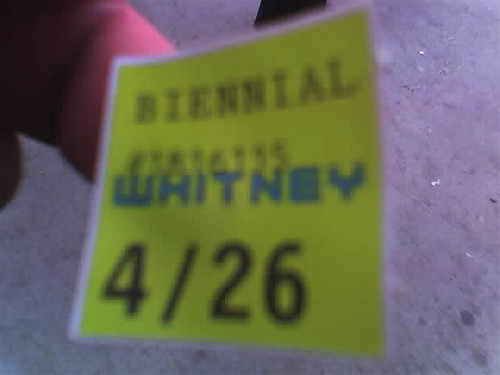
I visited the Whitney Biennial for free, because I'm talking with people there about working on a commission.
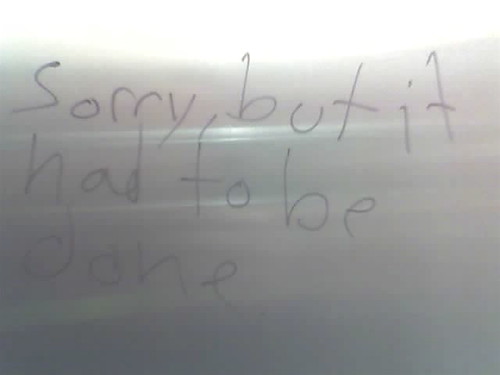
A piece of outsider art in the bathroom stalls at the Whitney. I like the self-effacing quality of this graffiti--as though the Biennial has forced their hand, and now they have to "mark" and "own" the negative space of the bathroom stall. (That would be my crit theory essay.)
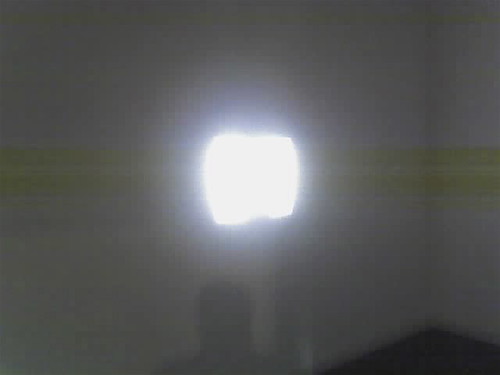
A film projection of someone re-enacting Charlie Chaplin's speech from "The Great Dictator" in sign language, looped. Now it looks like a portal to heaven, or perhaps just a white glob.
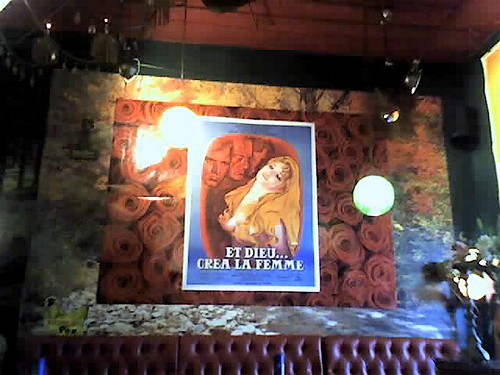
Robin des Bois on Smith Street, shortly before I hurt myself on an errant olive pit in the middle of an intense emotional conversation with my wife.
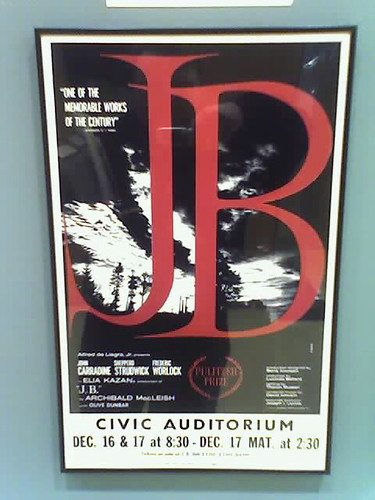
Poster for JB on Broadway, from the Performing Arts Library at Lincoln Center where I'm doing research on Barnum and Brecht. I was in JB in 1992. I played the voice of God, and every time I performed it, I was naked "for dramatic effect and resonance." I was young.

This is the worst logo I have ever actually seen designed. JM spotted it in our neighborhood—it's theoretically to protest police brutality to medical marijuana users, but I think it's my eyes that have been punished.
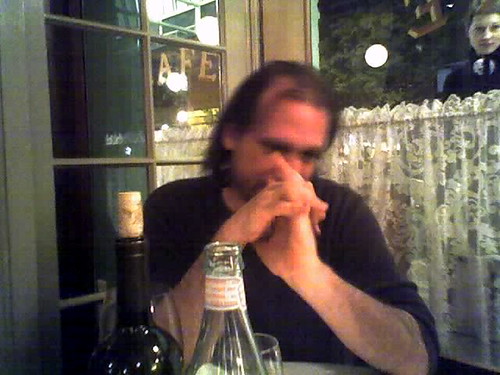
My friend Lawrence, seen again after too-long absence. His lovely wife Larissa is in the window. He is recounting how there is a colony in France that writers and artists can go to, but that it will be broiling hot and that the dogs attack the artists in the streets. I do not think we will be going to this colony.

I visited the Whitney Biennial for free, because I'm talking with people there about working on a commission.

A piece of outsider art in the bathroom stalls at the Whitney. I like the self-effacing quality of this graffiti--as though the Biennial has forced their hand, and now they have to "mark" and "own" the negative space of the bathroom stall. (That would be my crit theory essay.)

A film projection of someone re-enacting Charlie Chaplin's speech from "The Great Dictator" in sign language, looped. Now it looks like a portal to heaven, or perhaps just a white glob.

Robin des Bois on Smith Street, shortly before I hurt myself on an errant olive pit in the middle of an intense emotional conversation with my wife.

Poster for JB on Broadway, from the Performing Arts Library at Lincoln Center where I'm doing research on Barnum and Brecht. I was in JB in 1992. I played the voice of God, and every time I performed it, I was naked "for dramatic effect and resonance." I was young.

This is the worst logo I have ever actually seen designed. JM spotted it in our neighborhood—it's theoretically to protest police brutality to medical marijuana users, but I think it's my eyes that have been punished.

My friend Lawrence, seen again after too-long absence. His lovely wife Larissa is in the window. He is recounting how there is a colony in France that writers and artists can go to, but that it will be broiling hot and that the dogs attack the artists in the streets. I do not think we will be going to this colony.
The Polenblog - Everything You Ever Wanted to Know about the Polenberg Twins. » Oh IM Madness, how I’ve missed you. . .
The Polenblog - Everything You Ever Wanted to Know about the Polenberg Twins. » Oh IM Madness, how I’ve missed you. . .:
drplacebo: i’m going to get a gyro.
Twin C 723: ok - i’ll be here, gyro
Twin C 723: did you ever know that you’re my gyro. . .
drplacebo: eww
Twin C 723: i just asked a manager if she needed anything from office depot.
Twin C 723: she tells me: I need one of those notebooks people use to take notes at meetings but I am not sure you can get them there. Do you know what I am referring to? (That other manager) might use them too.
drplacebo: did you say “you mean the ones… with paper in them?”
Twin C 723: almost
Twin C 723: Is it 8 ½ by 11 inches or smaller? Wirebound or more like a pad? Lined paper or blank? Anything special about the cover?
Twin C 723: i thought those were good questions.
Twin C 723: not “DO YOU THINK I READ MINDS?”
drplacebo: and most importantly: does it have a picture of a kitten on it?
Twin C 723: kittie!
Twin C 723: Does it fit in a Trapper Keeper or a Data Center?
drplacebo: is it controlled by the Master Control Program?
Twin C 723: Does it have a black and white speckled cover?
Twin C 723: Does it only say “yes” or “no”?
drplacebo: no no no no nnonononono
Twin C 723: Ut oh.
Twin C 723: MY RECOGNIZER A SPLODE
drplacebo: nice
drplacebo: i’m going to get a gyro.
Twin C 723: ok - i’ll be here, gyro
Twin C 723: did you ever know that you’re my gyro. . .
drplacebo: eww
Twin C 723: i just asked a manager if she needed anything from office depot.
Twin C 723: she tells me: I need one of those notebooks people use to take notes at meetings but I am not sure you can get them there. Do you know what I am referring to? (That other manager) might use them too.
drplacebo: did you say “you mean the ones… with paper in them?”
Twin C 723: almost
Twin C 723: Is it 8 ½ by 11 inches or smaller? Wirebound or more like a pad? Lined paper or blank? Anything special about the cover?
Twin C 723: i thought those were good questions.
Twin C 723: not “DO YOU THINK I READ MINDS?”
drplacebo: and most importantly: does it have a picture of a kitten on it?
Twin C 723: kittie!
Twin C 723: Does it fit in a Trapper Keeper or a Data Center?
drplacebo: is it controlled by the Master Control Program?
Twin C 723: Does it have a black and white speckled cover?
Twin C 723: Does it only say “yes” or “no”?
drplacebo: no no no no nnonononono
Twin C 723: Ut oh.
Twin C 723: MY RECOGNIZER A SPLODE
drplacebo: nice
The Stranger | Seattle | Features | Feature | FROM THE ARCHIVES [Aug 16, 1995]
He-Man Jew-Haters Club
He-Man Jew-Haters Club:
For seven years, Seattle artists and audiences unwittingly supported a coterie of paranoid racists who managed the Odd Fellows Temple on Capitol Hill. In 1995, Matthew Richter, then performance editor of The Stranger, went undercover to find out who they were and what they were up to. By the time this story was published, on August 16, 1995, Richter had received multiple death threats and traveled with a bodyguard. This is the first article in what became a three-part series. —Eds.
For seven years, Seattle artists and audiences unwittingly supported a coterie of paranoid racists who managed the Odd Fellows Temple on Capitol Hill. In 1995, Matthew Richter, then performance editor of The Stranger, went undercover to find out who they were and what they were up to. By the time this story was published, on August 16, 1995, Richter had received multiple death threats and traveled with a bodyguard. This is the first article in what became a three-part series. —Eds.
A grand unified theory of YouTube and MySpace. By Paul Boutin
A grand unified theory of YouTube and MySpace. By Paul Boutin:
I was skeptical when I heard how huge video-sharing hub YouTube and social-networking hotspot MySpace have become. YouTube claims 40 million plays a day, up from 35 million just a week ago. The Washington Post recently reported that MySpace pulls more monthly visitors than Amazon and is closing in on AOL and eBay. Both sites are vague about their traffic details, though, so I ran them through Alexa, the traffic report generator favored by techies who don't trust press releases. I nearly fell out of my chair. On Alexa's charts, MySpace is an order of magnitude bigger than Friendster. YouTube will pass CNN any day now.
...
But the focus on the collaborative nature of these sites has been nagging at me. Sites like Friendster and Blogger that promote sharing and friend-making have been around for years with nowhere near the mainstream success. I've got a different theory. YouTube and MySpace are runaway hits because they combine two attributes rarely found together in tech products. They're easy to use, and they don't tell you what to do.
I was skeptical when I heard how huge video-sharing hub YouTube and social-networking hotspot MySpace have become. YouTube claims 40 million plays a day, up from 35 million just a week ago. The Washington Post recently reported that MySpace pulls more monthly visitors than Amazon and is closing in on AOL and eBay. Both sites are vague about their traffic details, though, so I ran them through Alexa, the traffic report generator favored by techies who don't trust press releases. I nearly fell out of my chair. On Alexa's charts, MySpace is an order of magnitude bigger than Friendster. YouTube will pass CNN any day now.
...
But the focus on the collaborative nature of these sites has been nagging at me. Sites like Friendster and Blogger that promote sharing and friend-making have been around for years with nowhere near the mainstream success. I've got a different theory. YouTube and MySpace are runaway hits because they combine two attributes rarely found together in tech products. They're easy to use, and they don't tell you what to do.
Thursday, April 27, 2006

House Speaker Dennis Hastert of Ill., center, gets out of a Hydrogen Alternative Fueled automobile, left, as he prepares to board his SUV, which uses gasoline, after holding a new conference at a local gas station in Washington, Thursday, April 27, 2006 to discuss the recent rise in gas prices. Hastert and other members of Congress drove off in the Hydrogen-Fueled cars only to switch to their official cars to drive back the few block back to the U.S. Capitol.
The Stranger | Seattle | Film | Feature | Once More with Feeling
The Stranger | Seattle | Film | Feature | Once More with Feeling:
United 93 gets around this problem by eschewing traditional characterization: Though all of the (nonprofessional and low-profile) actors are portraying specific passengers, it's next to impossible to sort out who's who. We see them as their fellow passengers did: a mass of strangers and sudden allies, not individual saints. Other choices take the movie in a direction that satisfies action-movie expectations, even as it abandons the historical record. The passengers in this movie don't take a democratic vote about their course of action (as they actually did—a historical fact championed by theorist Elaine Scarry as evidence that it's possible to quickly and democratically respond to crisis post-9/11); instead, burly thirty- and fortysomething guys decide to do something and others seem to fall into line.
United 93 gets around this problem by eschewing traditional characterization: Though all of the (nonprofessional and low-profile) actors are portraying specific passengers, it's next to impossible to sort out who's who. We see them as their fellow passengers did: a mass of strangers and sudden allies, not individual saints. Other choices take the movie in a direction that satisfies action-movie expectations, even as it abandons the historical record. The passengers in this movie don't take a democratic vote about their course of action (as they actually did—a historical fact championed by theorist Elaine Scarry as evidence that it's possible to quickly and democratically respond to crisis post-9/11); instead, burly thirty- and fortysomething guys decide to do something and others seem to fall into line.
Team Party Crash: Daily Candy’s Book Party - Gawker
Team Party Crash: Daily Candy’s Book Party - Gawker:
If you don’t know what Daily Candy is, you must have a below-average tolerance for shopping tips dressed up with sickly sweet cartoon graphics. Either that, or you’re a guy. You see, every last un-fat chick in New York — and dozens of other cities — gets a mind-numbingly chipper email every day from these ladies. If you don’t believe me, ask your girlfriend. This is how they know where to shop and what color lipstick to wear and which day in spring is the official “Girls Start Wearing Skirts Day.”
If you don’t know what Daily Candy is, you must have a below-average tolerance for shopping tips dressed up with sickly sweet cartoon graphics. Either that, or you’re a guy. You see, every last un-fat chick in New York — and dozens of other cities — gets a mind-numbingly chipper email every day from these ladies. If you don’t believe me, ask your girlfriend. This is how they know where to shop and what color lipstick to wear and which day in spring is the official “Girls Start Wearing Skirts Day.”

Holy Bea Arthur in a bathing suit--someone else's photostream of our shows are out in the world. I can even see other photos from this person, see their contacts...ah, the precarious joys of the internets.
Judge Embeds a Puzzle in 'Da Vinci Code' Ruling - New York Times
Judge Embeds a Puzzle in 'Da Vinci Code' Ruling - New York Times:
LONDON, April 26 — Justice Peter Smith's 71-page ruling in the recent "Da Vinci Code" copyright case here is notable for many things: the judge's occasional forays into literary criticism, his snippy remarks about witnesses on both sides, and his fluent knowledge not only of copyright law but also of more esoteric topics like the history of the Knights Templar.
But there is more to it than that. Embedded in the first 13½ pages of the ruling is Justice Smith's very own secret code, one that when partly solved reveals its name: the Smithy Code.
"The key to solving the conundrum posed by this judgment is in reading HBHG and DVC," the judge writes in the 52nd paragraph of the ruling, alluding to his code and referring to the two works at issue in the case —"The Holy Blood and the Holy Grail" and "The Da Vinci Code" — by their initials. (In the United States, the book is called "Holy Blood, Holy Grail.")
LONDON, April 26 — Justice Peter Smith's 71-page ruling in the recent "Da Vinci Code" copyright case here is notable for many things: the judge's occasional forays into literary criticism, his snippy remarks about witnesses on both sides, and his fluent knowledge not only of copyright law but also of more esoteric topics like the history of the Knights Templar.
But there is more to it than that. Embedded in the first 13½ pages of the ruling is Justice Smith's very own secret code, one that when partly solved reveals its name: the Smithy Code.
"The key to solving the conundrum posed by this judgment is in reading HBHG and DVC," the judge writes in the 52nd paragraph of the ruling, alluding to his code and referring to the two works at issue in the case —"The Holy Blood and the Holy Grail" and "The Da Vinci Code" — by their initials. (In the United States, the book is called "Holy Blood, Holy Grail.")
Wednesday, April 26, 2006
And You Thought Abercrombie & Fitch Was Pushing It? - New York Times
And You Thought Abercrombie & Fitch Was Pushing It? - New York Times:
Strewn around the vintage 1970's couches, you're likely to see an assortment of fabric scraps and prototype T-shirts beside samples of unusual light bulbs that Charney wants to test for store displays. On his desk sit copies of Playboy from the 1980's, their pages carefully annotated and tabbed with colored stickers denoting their depiction of socks, pants, T-shirts, electronics, car designs and other markers of style from the period. Next to these is a stack of come-on letters from television and film casting directors hoping to get Charney to supply them with the kind of fresh and unusual faces on display in American Apparel's provocative print ads. Further over you'll find some books that Charney has been consulting, including a collection of Andy Warhol's early hand-painted works; "The Concise 48 Laws of Power," by Robert Greene; and "The Medium Is the Massage," by Charney's fellow Canadian Marshall McLuhan. Pinned to the rear wall is some classic National Geographic-style cheesecake: pages ripped from a 1975 "Girls of Polynesia" calendar.
Strewn around the vintage 1970's couches, you're likely to see an assortment of fabric scraps and prototype T-shirts beside samples of unusual light bulbs that Charney wants to test for store displays. On his desk sit copies of Playboy from the 1980's, their pages carefully annotated and tabbed with colored stickers denoting their depiction of socks, pants, T-shirts, electronics, car designs and other markers of style from the period. Next to these is a stack of come-on letters from television and film casting directors hoping to get Charney to supply them with the kind of fresh and unusual faces on display in American Apparel's provocative print ads. Further over you'll find some books that Charney has been consulting, including a collection of Andy Warhol's early hand-painted works; "The Concise 48 Laws of Power," by Robert Greene; and "The Medium Is the Massage," by Charney's fellow Canadian Marshall McLuhan. Pinned to the rear wall is some classic National Geographic-style cheesecake: pages ripped from a 1975 "Girls of Polynesia" calendar.

And this beautiful building is going to become...a Borders!
Some would be indignant & rant on how unfair this is...but I have to say, it used to be a BANK. At least now I'll have a reason to wander inside and see the architecture. It's on the ground floor of a tower many believe to be the most phallic building in New York City.
Brief mention of GREAT MEN OF GENIUS in May's L Magazine, on newsstands now. My favorite pull quote:
Mike Daisey makes storytelling sexy...he takes autobiographical anecdotes to insane levels of hilarity.
MWAHAHAHAHHA! My plan for storytelling domination is nearly complete—I now have to only capture "cute," "Hamburgler-esque," and "tremulous" for the win!
Making Light: "Fanfic": force of nature
Making Light: "Fanfic": force of nature:
Well, I live in a state that owes its name to fanfic: California is named after the island of California, home of Queen Calafia, her beautiful black amazons and their man-eating griffins, as all detailed in Garcia Ordonez de Montalvo's Las Sergas de Esplandian, which was the Sword of Shanarra of its day, a highly unauthorized but popular sequel to the much more highly respected Amadis de Gaul, more The Lord of the Rings of its day. At the end of Don Quixote, Cervantes had this to say about Esplandian: "Verily the father's goodness shall not excuse the want of it in the son. Here, good mistress housekeeper, open that window and throw it into the yard. Let it serve as a foundation to that pile which we are to set a-blazing presently."
That being said, Las Sergas de Esplandian was the pulp novel the conquistadores had on board when they sailed around and encountered the Baja peninsula. What's more, when the Portola party went up the coast, thinking the descriptions in LSdE were based on actual travelers' tales, they thought the California condors were Queen Calafia's big black man-eating griffins.
And so on to the present day where California is ruled by Conan the Barbarian.
Well, I live in a state that owes its name to fanfic: California is named after the island of California, home of Queen Calafia, her beautiful black amazons and their man-eating griffins, as all detailed in Garcia Ordonez de Montalvo's Las Sergas de Esplandian, which was the Sword of Shanarra of its day, a highly unauthorized but popular sequel to the much more highly respected Amadis de Gaul, more The Lord of the Rings of its day. At the end of Don Quixote, Cervantes had this to say about Esplandian: "Verily the father's goodness shall not excuse the want of it in the son. Here, good mistress housekeeper, open that window and throw it into the yard. Let it serve as a foundation to that pile which we are to set a-blazing presently."
That being said, Las Sergas de Esplandian was the pulp novel the conquistadores had on board when they sailed around and encountered the Baja peninsula. What's more, when the Portola party went up the coast, thinking the descriptions in LSdE were based on actual travelers' tales, they thought the California condors were Queen Calafia's big black man-eating griffins.
And so on to the present day where California is ruled by Conan the Barbarian.
The Stranger | Seattle | Slog: The Stranger's Blog | Archives

Shooting Just Now on Capitol Hill:
There is a dead man on his back in the street outside Twice Sold Tales, on John Street, half a block east of Broadway. I have a perfect view of the scene from my apartment window. The man is naked but covered in a white sheet. His face and body and legs are hidden from view, but his white feet are poking out of the sheet. Clumps of his clothes are next to him. (Some people in the building watched the cops strip him naked and got a look at all his bullet wounds.) His shoes are off and they lay near his feet. The dead man is white and he lived on the street, according to a chaplain who explained a little bit about what was going on when I arrived home to my block cordoned off in yellow tape about a half an hour ago. Apparently the dead man was wielding a gun and was perceived to be enough of a threat by the cops—some say he was firing the gun, everyone’s account is different—that they shot and killed him. A minute ago three cops were scanning the exterior walls of Perfect Copy & Print, presumably looking for bullet holes. Another just shined his flashlight on an old-fashioned hand pistol with a wooden handle on the sidewalk just in front of KT Imports (that’s the sign on the empty storefront between Perfect Copy & Print and Twice Sold Tales). They’re not touching it.
Tuesday, April 25, 2006
Article in Variety about GREAT MEN OF GENIUS:
Mike Daisey has always performed without a net. His best-known work, "21 Dog Years: Doing Time @ Amazon.com," was an unscripted monologue -- an ever-changing account of his stint with the Seattle-based Internet megastore, delivered live Off Broadway every night for six months straight.
But now he's practicing an even riskier high-wire act. This month, Daisey debuted four improvised monologues titled "Great Men of Genius" on four consecutive nights at Seattle's Capitol Hill Arts Center. That's four premieres in a row with nothing sharing his spotlight but a table, a chair and a rudimentary outline written in longhand on yellow paper.
Read the whole thing here.
Mike Daisey has always performed without a net. His best-known work, "21 Dog Years: Doing Time @ Amazon.com," was an unscripted monologue -- an ever-changing account of his stint with the Seattle-based Internet megastore, delivered live Off Broadway every night for six months straight.
But now he's practicing an even riskier high-wire act. This month, Daisey debuted four improvised monologues titled "Great Men of Genius" on four consecutive nights at Seattle's Capitol Hill Arts Center. That's four premieres in a row with nothing sharing his spotlight but a table, a chair and a rudimentary outline written in longhand on yellow paper.
Read the whole thing here.
Rabbi Moses Teitelbaum Is Dead at 91 - New York Times
Rabbi Moses Teitelbaum Is Dead at 91 - New York Times:
Moses Teitelbaum, the grand rabbi of the Satmar Hasidim, one of the world's largest and fastest-growing sects of Orthodox Jews, died yesterday in Manhattan. He was 91 and lived in Williamsburg, Brooklyn.
Moses Teitelbaum, the grand rabbi of the Satmar Hasidim, one of the world's largest and fastest-growing sects of Orthodox Jews, died yesterday in Manhattan. He was 91 and lived in Williamsburg, Brooklyn.
Monday, April 24, 2006
The New Yorker: Shouts and Murmurs
THE LONELY PLANET GUIDE TO MY APARTMENT :
My Apartment’s vast expanse of unfurnished space can be daunting at first, and its population of one difficult to communicate with. After going through customs, you’ll see a large area with a couch to the left. Much of My Apartment’s “television viewing” occurs here, as does the very occasional making out with a girl (see “Festivals”). To the north is the food district, with its colorful cereal boxes and antojitos, or “little whims.”
My Apartment’s vast expanse of unfurnished space can be daunting at first, and its population of one difficult to communicate with. After going through customs, you’ll see a large area with a couch to the left. Much of My Apartment’s “television viewing” occurs here, as does the very occasional making out with a girl (see “Festivals”). To the north is the food district, with its colorful cereal boxes and antojitos, or “little whims.”
alg: P&Ls and how books make (or don't) money: part the first: the mass market original complete failure
P&Ls and how books make (or don't) money: part the first: the mass market original complete failure:
In which I explain how we figure out how much money to pay authors for their advance, and also in which I explain how sometimes books make money and sometimes they don't.
In which I explain how we figure out how much money to pay authors for their advance, and also in which I explain how sometimes books make money and sometimes they don't.
Richard Eckersley, 65, Graphic Designer, Dies - New York Times:
In 1989, however, Mr. Eckersley made a radical departure from his signature restraint, shaking up the field with his design for Avital Ronell's "Telephone Book: Technology, Schizophrenia, Electric Speech," an unorthodox study of Jacques Derrida, Martin Heidegger and the philosophy of deconstruction. This was the first book Mr. Eckersley designed on the computer, using new page-making software programs to interpret the author's complex postmodern ideas typographically.
Although the stark black-and-white cover of this long vertical book was rather quiet, he radically dislodged the interior text from conventional settings, and the book's layout sometimes upstages the text by deliberately impeding the act of reading, which is just what Ms. Ronell wanted. Throughout the book there are unexplained gaps and dislocations between sentences and paragraphs, forcing the reader to work at reading. On one page is a mirror image of the page that faces it. On another, snakelike trails of space that come from careless word spacing (called rivers) are intentionally employed. Some words are blurred to the point of being indecipherable; one line runs into another because of the exaggerated use of negative line-spacing.
In 1989, however, Mr. Eckersley made a radical departure from his signature restraint, shaking up the field with his design for Avital Ronell's "Telephone Book: Technology, Schizophrenia, Electric Speech," an unorthodox study of Jacques Derrida, Martin Heidegger and the philosophy of deconstruction. This was the first book Mr. Eckersley designed on the computer, using new page-making software programs to interpret the author's complex postmodern ideas typographically.
Although the stark black-and-white cover of this long vertical book was rather quiet, he radically dislodged the interior text from conventional settings, and the book's layout sometimes upstages the text by deliberately impeding the act of reading, which is just what Ms. Ronell wanted. Throughout the book there are unexplained gaps and dislocations between sentences and paragraphs, forcing the reader to work at reading. On one page is a mirror image of the page that faces it. On another, snakelike trails of space that come from careless word spacing (called rivers) are intentionally employed. Some words are blurred to the point of being indecipherable; one line runs into another because of the exaggerated use of negative line-spacing.
Man Writes Poem
This just in a man has begun writing a poem
in a small room in Brooklyn. His curtains
are apparently blowing in the breeze. We go now
to our man Harry on the scene, what's
the story down there Harry? "Well Chuck
he has begun the second stanza and seems
to be doing fine, he's using a blue pen, most
poets these days use blue or black ink so blue
is a fine choice. His curtains are indeed blowing
in a breeze of some kind and what's more his radiator
is 'whistling' somewhat. No metaphors have been written yet,
but I'm sure he's rummaging around down there
in the tin cans of his soul and will turn up something
for us soon. Hang on--just breaking news here Chuck,
there are 'birds singing' outside his window, and a car
with a bad muffler has just gone by. Yes ... definitely
a confirmation on the singing birds." Excuse me Harry
but the poem seems to be taking on a very auditory quality
at this point wouldn't you say? "Yes Chuck, you're right,
but after years of experience I would hesitate to predict
exactly where this poem is going to go. Why I remember
being on the scene with Frost in '47, and with Stevens in '53,
and if there's one thing about poems these days it's that
hang on, something's happening here, he's just compared the curtains
to his mother, and he's described the radiator as 'Roaring deep
with the red walrus of History.' Now that's a key line,
especially appearing here, somewhat late in the poem,
when all of the similes are about to go home. In fact he seems
a bit knocked out with the effort of writing that line,
and who wouldn't be? Looks like ... yes, he's put down his pen
and has gone to brush his teeth. Back to you Chuck." Well
thanks Harry. Wow, the life of the artist. That's it for now,
but we'll keep you informed of more details as they arise.
Jay Leeming
This just in a man has begun writing a poem
in a small room in Brooklyn. His curtains
are apparently blowing in the breeze. We go now
to our man Harry on the scene, what's
the story down there Harry? "Well Chuck
he has begun the second stanza and seems
to be doing fine, he's using a blue pen, most
poets these days use blue or black ink so blue
is a fine choice. His curtains are indeed blowing
in a breeze of some kind and what's more his radiator
is 'whistling' somewhat. No metaphors have been written yet,
but I'm sure he's rummaging around down there
in the tin cans of his soul and will turn up something
for us soon. Hang on--just breaking news here Chuck,
there are 'birds singing' outside his window, and a car
with a bad muffler has just gone by. Yes ... definitely
a confirmation on the singing birds." Excuse me Harry
but the poem seems to be taking on a very auditory quality
at this point wouldn't you say? "Yes Chuck, you're right,
but after years of experience I would hesitate to predict
exactly where this poem is going to go. Why I remember
being on the scene with Frost in '47, and with Stevens in '53,
and if there's one thing about poems these days it's that
hang on, something's happening here, he's just compared the curtains
to his mother, and he's described the radiator as 'Roaring deep
with the red walrus of History.' Now that's a key line,
especially appearing here, somewhat late in the poem,
when all of the similes are about to go home. In fact he seems
a bit knocked out with the effort of writing that line,
and who wouldn't be? Looks like ... yes, he's put down his pen
and has gone to brush his teeth. Back to you Chuck." Well
thanks Harry. Wow, the life of the artist. That's it for now,
but we'll keep you informed of more details as they arise.
Jay Leeming
The Rockmart Journal
The Rockmart Journal:
A Rockmart family is being sued for illegal music file sharing, despite the fact that they don’t even own a computer.
This came as shocking news to the Walls family, who were notified of the lawsuit Friday afternoon by a newspaper reporter. James Walls, speaking on behalf of his wife and family, said they have not been served with legal papers and were unaware of the lawsuit.
After being shown a copy of the court filing, Walls said he found the whole thing bewildering.
“I don’t understand this,” Walls said. “How can they sue us when we don’t even have a computer?”
A Rockmart family is being sued for illegal music file sharing, despite the fact that they don’t even own a computer.
This came as shocking news to the Walls family, who were notified of the lawsuit Friday afternoon by a newspaper reporter. James Walls, speaking on behalf of his wife and family, said they have not been served with legal papers and were unaware of the lawsuit.
After being shown a copy of the court filing, Walls said he found the whole thing bewildering.
“I don’t understand this,” Walls said. “How can they sue us when we don’t even have a computer?”
Sunday, April 23, 2006
Saturday, April 22, 2006
small spiral notebook
small spiral notebook - Shock:
In the test I reacted only mildly to foods I have eaten without incident many times. The shrimp barely showed up. He suspects it is an issue of combination: alcohol, an allergen, and exertion like dancing—in other words, "fun"—and next thing I know I am in the hospital. But we can't say for sure. I could be wrong about the whole shrimp guess. Maybe it's peanuts. But maybe it's almost anything.
The allergist gives me a pamphlet on anaphylactic shock. Among the symptoms: "a sense of impending doom."
In the test I reacted only mildly to foods I have eaten without incident many times. The shrimp barely showed up. He suspects it is an issue of combination: alcohol, an allergen, and exertion like dancing—in other words, "fun"—and next thing I know I am in the hospital. But we can't say for sure. I could be wrong about the whole shrimp guess. Maybe it's peanuts. But maybe it's almost anything.
The allergist gives me a pamphlet on anaphylactic shock. Among the symptoms: "a sense of impending doom."












